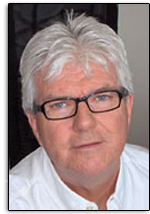A few decades ago, anyone with a sketchbook or camera could have looked almost anywhere and recorded a vivid trail of destruction and disregard of the environment. But only a few journalists and authors were able to recognize the looming problem. It was there to be found.
But at least it was there to be found. Now, the nature of environmental news is often profoundly different. Biologists these days are more inclined to talk about ecosystem integrity than the problems facing birds of prey or some other individual charismatic animals. The subject of sprawl is as diffuse and diverse as the landscapes that are encompassed by it. Concerns about air pollution have migrated - from the choking plumes of old to the smallest of particles that penetrate deep into the lungs and to the invisible heat-trapping greenhouse gases (GHGs) linked to global warming, led by innocuous carbon dioxide, a.k.a. the bubbles in beer. Even though scientists say the main cause of recent warming is smokestack and tailpipe emissions, projections of the pace and ramifications of future climate changes remain as muddy as the mix of clouds, particles, and gases that determine how much sunlight reaches the earth and how much heat radiates back into space - the balance that sets the global thermostat.
Like an invading army, climate change continues its relentless march, taking its toll with impunity. Recently a Harvard University professor reported that 7000-year-old mummies in Chile are turning into black ooze' because the air in which they lie is getting more humid. In Florida, there's news that state employees have been barred from using the term climate change. Since the state is drowning in rising tides, one might think this restriction is pretty lame. According to the Florida Center for Investigative reporting, some workers at the Florida Department of the Environment say they really have been directed to avoid the term even when conversations are about conserving the coastline or the coral reefs. Officials are answering the challenges raised about how ludicrous the rule is by simply stating they can't discuss the subject because they themselves are not scientists. This attitude seems to be working because even the former governor and presidential hopeful Jeb Bush has revealed that he, too, is not a scientist. The list of the state's public officials who are also conveniently not scientists is growing rapidly. As Gail Collins, a New York Times journalist put it, "Have you ever heard anybody say he couldn't comment on tax policy because he wasn't an accountant?"
Climate change is perhaps the greatest long-term issue the next American president and Canadian Prime Minister will have to deal with. International enemies will come and go and economic fortunes and misfortunes will rise and fall. But if the atmosphere keeps getting clogged with GHGs, future generations will be too busy with floods and droughts to care or even think about why. If one were running for president of the U.S. or Canadian prime minister, one would think that the candidates would really want to study up on the subject rather than moving forward with one's head in the sand.
These people don't act like people who think the scientists are wrong when they say global warming is real, and that human activity creates all or part of the problem. They act like people who don't want to face up to the facts and come up with solutions, which would involve making the coal and oil companies super unhappy. They're sort of like the mayor in the movie Jaws' who won't admit there's a killer shark out there because it's the start of the town's tourist season.1
It's one thing to be a climate-change denier like the chairman of the Environment and Public Works Committee, who brought a snowball into the Senate to demonstrate his conviction that the earth is not getting warmer. It's another to pretend as if it's O.K. to dodge the whole question. Here's how this circus show played out in the press:2
WASHINGTON (CNN) - An Oklahoma senator, who claims climate change does not exist, brought a snowball onto the Senate floor as proof for his argument.
"In case we have forgotten, because we keep hearing that 2014 has been the warmest year on record," said Sen. Jim Inhofe. "I ask the chair, do you know what this is? It's a snowball just from outside here. So it's very, very cold out. Very unseasonable."
However, not everyone was impressed with his demonstration.
"I want to respond to the presentation by one of the Republican senators suggesting that the continued existence of snow disproves climate change," Whitehouse said.
Whitehouse explained how studies by NASA and other credible organizations have proven that the planet is warming.
Inhofe is the chairman of the Environment and Public Works Committee.
The challenges encountered in meaningfully translating such issues for the public are enormous for many reasons. Some relate to the subtlety or complexity of the pollution and ecological issues that remain after glaring problems have been addressed. Others relate to effective, well-financed efforts by some industries and groups that oppose pollution restrictions to amplify the uncertainties in environmental science. These same groups also have no compunction in exploiting the tendency of journalists to seek two sides to any issue. This approach can effectively perpetrate confusion, contention, and ultimately public disengagement and inaction.
On the other side of the debate, environmental groups are not totally innocent themselves. In some cases, they have focused media attention on their favoured issues by going beyond the data and magnifying the risks of say, cancer or abrupt climate change. The rhetoric swelled in the spring of 2006 as documentary films, books, and magazine cover stories endeavoured to directly link the outbreak of hurricanes and particularly the ferocity of Hurricane Katrina to the slow buildup of heat in the world's oceans from human activities. Shock value is something that encourages engagement.
Between the depictions of global warming as an unfolding catastrophe and as a non-event lies what appears to be the dominant and still troubling view: that the buildup of carbon dioxide and other long-lived GHGs poses a sufficient risk of profound and largely irreversible transformations of climate and coastlines to warrant prompt action to limit future harms. Because of population growth and increased energy use in developing countries, even the most optimistic scenarios project that concentrations of GHGs will continue to climb throughout the first half of this century.
As much as I believe climate change is real and is unmistakably now upon us, no one should expect to pick up a daily paper anytime soon and read a headline that takes climate science across some threshold of definitiveness that will suddenly spur public agitation and policy action - and if such a story does appear, I would urge that it be looked at with some skepticism.
1 Collins, Gail. "Globe? Warm? Who, Me?" The New York Times International Weekly (March 21-22, 2015): 15
2 https://kfor.com/2015/02/27/oklahoma-senator-brings-snowball-into-senate-as-evidence-against-global-warming/











